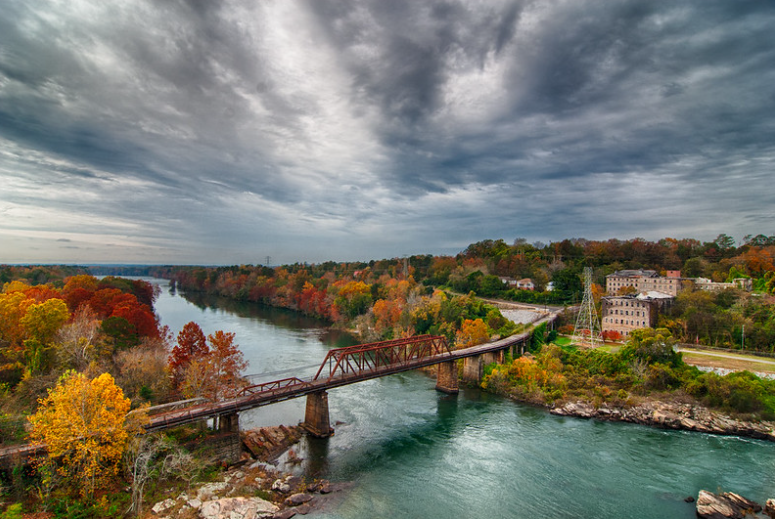I am not a native son of the South. But a decade after moving to Auburn, Alabama, I’m ready to dip my toes into the shallow end of editorializing about the Yellowhammer State’s fortunes for 1819 News.
Life is good in the bucolic college town of Auburn, surrounded by the piney woods and red clay of eastern Alabama. The people, the pace, the weather, and the landscape agree with me. It’s a great place to raise a family, as they say, but here the saying is true.
Auburn is booming. New condominiums spring up like weeds, while traffic backs up on roads built decades ago. Familiar woods seem to disappear almost overnight, making way for new housing developments or strip malls. Plumbers and HVAC repair services are booked for weeks. Subdivisions spring up, flushing deer and fox farther out of their forests.
Not everyone loves this, of course. “Keep Auburn Lovely” is one manifestation of the unease felt by longtime residents, who understandably worry about losing their close-knit village feel. Local politics these days is primarily about development, running along a spectrum of pro-growth, slow-growth, and anti-growth sentiments rather than Republican vs. Democrat polarities.
It certainly feels like a prosperous town. Whether that feeling is artificially stimulated by the largesse of our taxpayer-funded university, or even a Fed-fueled construction bubble, the brick-and-mortar buildings are real.
Growing pains are better than the alternative, and this could be said for Alabama as a whole. For every Huntsville or Fairhope, brimming with growth and new residents, there are dozens of small towns quietly decaying and losing population. The tradeoffs associated with development certainly are preferable to shuttered town squares and peeling antebellum mansions.
But growth is coming, and we should cheer it. We should be bullish about the future of our state. Growth means more people, jobs, opportunities, money, and business. It might even save a few of those mansions and help revitalize Montgomery and Birmingham along the way.
Here are four simple reasons why we should be bullish on Alabama:
Demographics: The graying of America bodes well for the Heart of Dixie. The number Americans over 65 is set to double over the next few decades, and older people tend to prefer warmer climes and easier living. Even before Covid, Northeast and Midwest residents were headed south, swelling new exurbs around 21st century megacities like Phoenix, Dallas-Fort Worth, and Orlando.
The pandemic accelerated this Great Relocation, and Alabama enjoys newfound popularity. According to a United Van Lines survey, new residents made us the #6 inbound state in 2021. The growing revolution in remote work opens Alabama up to highly-paid employees across the country who are fed up with big city dysfunction and a high cost of living. We have beautiful beaches, wonderful mild winters, plenty of available land, and housing stock to fit all budgets.
Economic Freedom: With a ranking of #22 in the nation, Alabama could do better in overall economic freedom, but it has improved significantly in the last 10 years. We remain one of the lowest-taxed states in the country, with a state and local burden below 10%. And the state’s business climate remains healthy, in the top half nationwide.
Fiscal Health: Alabama is in good fiscal health relative to many states, emerging from Covid with a record budget surplus of nearly $3 billion. Former Treasurer John McMillan took pains to shore up both the general fund and the education fund without raising taxes.
Our mysterious RSA pension fund accounting is a worrisome issue, as is the lack of corporate investment in the state. But compared to big blue states with huge unfunded (state and municipal) pension liabilities, Alabama is far better prepared to weather an economic downturn. Our relatively small population of 5 million also makes state budget matters more manageable.
Livability: The southern migration is nothing new, but if Alabama is late to the party, it is uniquely well positioned. Florida has always been an escape valve for New York and New Jersey, and its cities are now crowded and expensive. The Carolinas have been discovered, and then some. Georgia is dominated by Atlanta, politically and otherwise, and the same phenomenon appears set to happen with Nashville’s explosive growth.
Alabama, by contrast, is still relatively undiscovered and hence underrated. Median home prices are still well below the national average at roughly $150,000, placing Alabama among the top 10 cheapest states for homebuyers. Younger people looking to enjoy urban living among new breweries, nightclubs, and restaurants will find affordable apartments and townhouses in downtown Montgomery and Birmingham (albeit not without risk in “gentrifying” areas). Alabama can appeal to retirees looking to escape winter and usurious property taxes, while also attracting young people who feel the cost of “adulthood” (home ownership, marriage, children) may be too high elsewhere.
In sum, Alabama is beautiful, affordable, unspoiled, and uncrowded, with a strong economy and the kindest people in the country. Our challenge is to enjoy the benefits of our inevitable growth without losing the very qualities that attract that growth.
Jeff Deist is general counsel for Monetary Metals, and previously was president of the Mises Institute in Auburn for 10 years. He also served as chief of staff to congressman Ron Paul in Washington, DC.
The opinions expressed in this column are those of the author. The views and opinions expressed here are those of the author and do not necessarily reflect the policy or position of 1819 News. To comment, please send an email with your name and contact information to Commentary@1819News.com.
Don't miss out! Subscribe to our newsletter and get our top stories every weekday morning.










